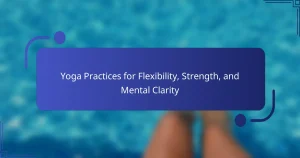Meditation offers significant benefits for reducing stress, enhancing focus, and promoting emotional balance. It lowers cortisol levels, improves cognitive functions, and fosters self-awareness. Regular practice can lead to better emotional regulation and resilience, while also improving sleep quality and relationships. Studies show that just 10-20 minutes of daily meditation can transform mental well-being.
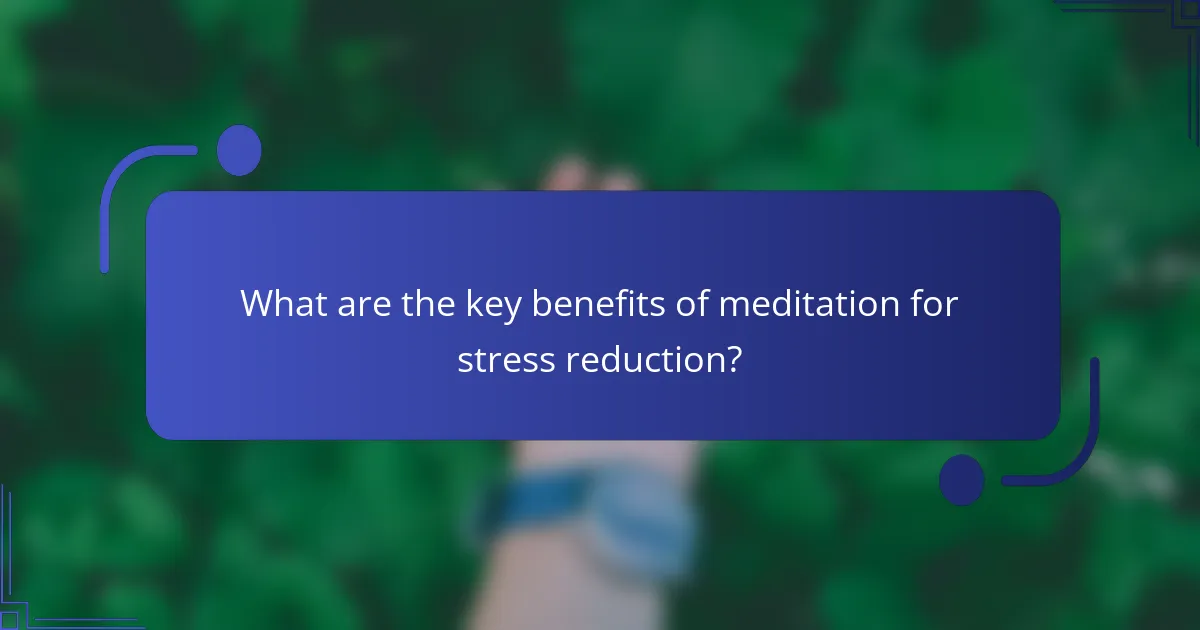
What are the key benefits of meditation for stress reduction?
Meditation significantly reduces stress by promoting relaxation, enhancing emotional balance, and improving focus. Regular practice lowers cortisol levels, which are linked to stress. It fosters mindfulness, allowing individuals to manage their reactions to stressors effectively. Additionally, meditation can lead to improved sleep quality, further supporting stress reduction. Studies indicate that just 10-20 minutes of daily meditation can yield substantial benefits in mental well-being and resilience.
How does meditation lower cortisol levels?
Meditation lowers cortisol levels by promoting relaxation and reducing stress. Regular practice can lead to significant decreases in cortisol, the hormone associated with stress. Research shows that mindfulness meditation decreases cortisol levels by approximately 30% in practitioners. This reduction contributes to improved emotional balance and enhanced focus, making meditation an effective tool for stress management.
Which meditation techniques are most effective for stress relief?
Mindfulness meditation, deep breathing exercises, and progressive muscle relaxation are the most effective techniques for stress relief. Mindfulness meditation enhances awareness and reduces anxiety by focusing on the present moment. Deep breathing exercises lower heart rate and promote relaxation, while progressive muscle relaxation releases tension throughout the body. Studies indicate that these methods significantly improve emotional balance and focus, making them valuable tools for managing stress effectively.
What role does mindfulness play in reducing stress?
Mindfulness significantly reduces stress by enhancing emotional regulation and promoting relaxation. It encourages individuals to focus on the present moment, which decreases anxiety and fosters a sense of calm. Regular practice of mindfulness meditation has been shown to lower cortisol levels, the hormone associated with stress. Additionally, it improves focus and emotional balance, leading to better coping mechanisms in challenging situations. Engaging in mindfulness can transform one’s approach to stress, making it a valuable tool for overall mental well-being.
How can meditation improve sleep quality and reduce anxiety?
Meditation can significantly enhance sleep quality and alleviate anxiety. Regular practice promotes relaxation, reduces stress hormones, and encourages a calm mind, leading to better sleep. Studies show that mindfulness meditation can decrease insomnia symptoms by 50%. Additionally, it fosters emotional balance, helping individuals manage anxiety more effectively.
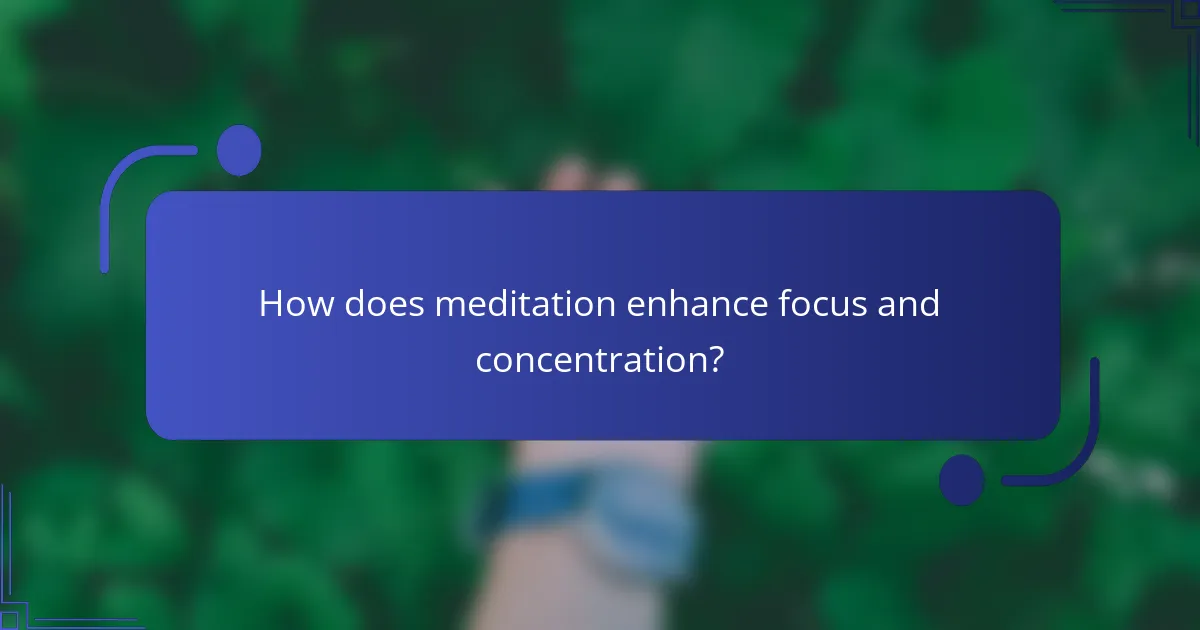
How does meditation enhance focus and concentration?
Meditation significantly enhances focus and concentration by training the mind to maintain attention on a single point. Regular practice improves cognitive functions, leading to better task performance and heightened awareness. Studies indicate that individuals who meditate show increased gray matter density in brain regions associated with attention and sensory processing. This structural change supports sustained focus, allowing for improved emotional regulation and reduced stress levels, creating a conducive environment for concentration.
What scientific studies support meditation’s impact on attention span?
Scientific studies demonstrate that meditation significantly enhances attention span. Research indicates that consistent meditation practice leads to improved focus and cognitive flexibility. A study published in the journal “Psychological Science” found that participants who engaged in mindfulness meditation exhibited better attention control compared to a control group. Another study in “Cognitive, Affective, & Behavioral Neuroscience” showed that just two weeks of meditation training improved participants’ attention and working memory. These findings support meditation’s role in fostering sustained attention and emotional balance.
Which meditation practices are best for improving cognitive performance?
Meditation practices that enhance cognitive performance include mindfulness meditation, transcendental meditation, and focused attention meditation. These techniques improve concentration, reduce stress, and promote emotional balance.
Mindfulness meditation encourages present-moment awareness, which enhances cognitive flexibility and decision-making. Research shows it can increase attention span and working memory. Transcendental meditation involves repeating a mantra, resulting in reduced anxiety and improved cognitive function. Focused attention meditation trains the mind to concentrate on a single object or thought, leading to better focus and mental clarity.
Regular practice of these meditation types can lead to significant improvements in cognitive performance, including enhanced memory and problem-solving skills.
How does focused meditation differ from other types?
Focused meditation differs from other types by emphasizing concentration on a single point of focus, such as breath or a mantra. This specific approach enhances stress reduction and improves emotional balance more effectively than general meditation practices. Focused meditation cultivates a deeper state of awareness, allowing individuals to manage stress responses better. In contrast, other types of meditation may involve broader awareness or visualization techniques, which can be less effective for immediate stress relief.
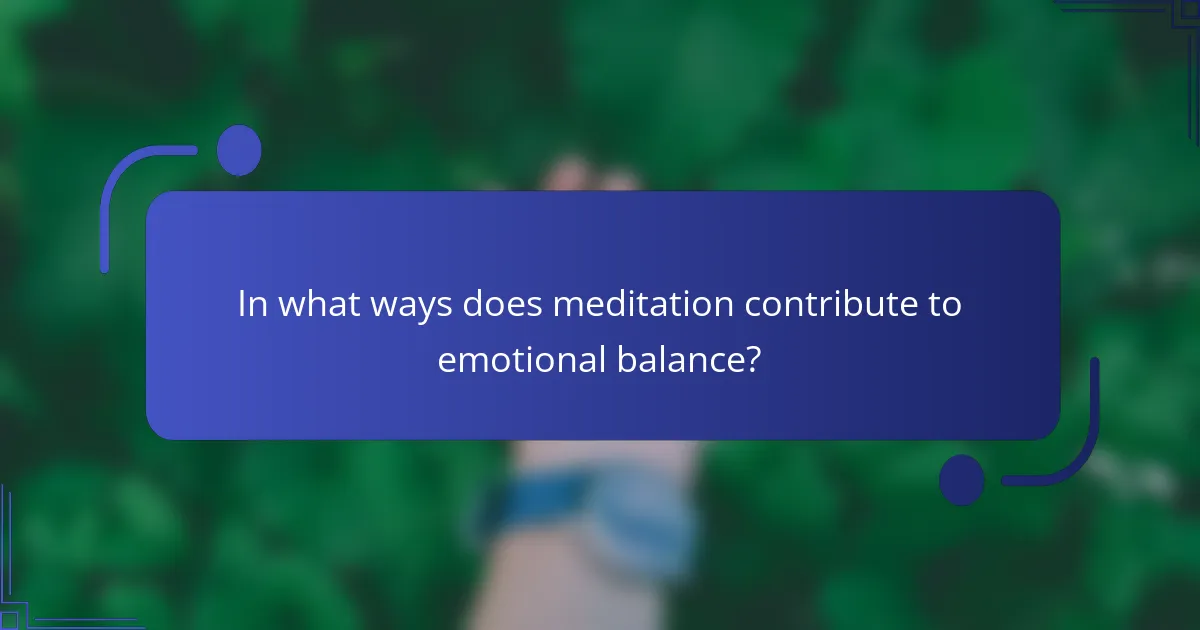
In what ways does meditation contribute to emotional balance?
Meditation contributes to emotional balance by reducing stress, enhancing focus, and promoting self-awareness. Regular practice leads to lower cortisol levels, improved mood stability, and better emotional regulation. For example, studies show that mindfulness meditation can increase positive emotions and decrease anxiety, fostering a greater sense of well-being. As a result, individuals often experience improved relationships and a more resilient mindset.
How can meditation help manage emotional responses?
Meditation effectively manages emotional responses by promoting relaxation and mindfulness. It reduces stress levels, enhances emotional regulation, and improves focus. Regular practice can lead to a more balanced emotional state, allowing individuals to respond to challenges with greater clarity and calmness. Studies show that meditation can decrease the production of stress hormones, which contributes to emotional stability.
What are the long-term emotional benefits of regular meditation practice?
Regular meditation practice offers long-term emotional benefits, including reduced anxiety, improved emotional regulation, and enhanced overall well-being. These benefits stem from consistent engagement with mindfulness techniques, which foster greater self-awareness and resilience. Research indicates that individuals who meditate regularly report lower levels of stress and greater emotional balance. In addition, meditation has been linked to changes in brain structure, promoting areas associated with emotional processing and regulation. This unique attribute makes meditation an effective tool for long-term emotional health.
How does meditation promote resilience against emotional distress?
Meditation enhances resilience against emotional distress by fostering mindfulness and emotional regulation. It cultivates awareness of thoughts and feelings, allowing individuals to respond rather than react to stressors. Studies show that regular meditation practice reduces anxiety and improves coping mechanisms, which are critical for emotional balance. Furthermore, meditation can lead to structural changes in the brain, enhancing areas responsible for emotional regulation, thereby providing a unique attribute that differentiates it from other stress management techniques.
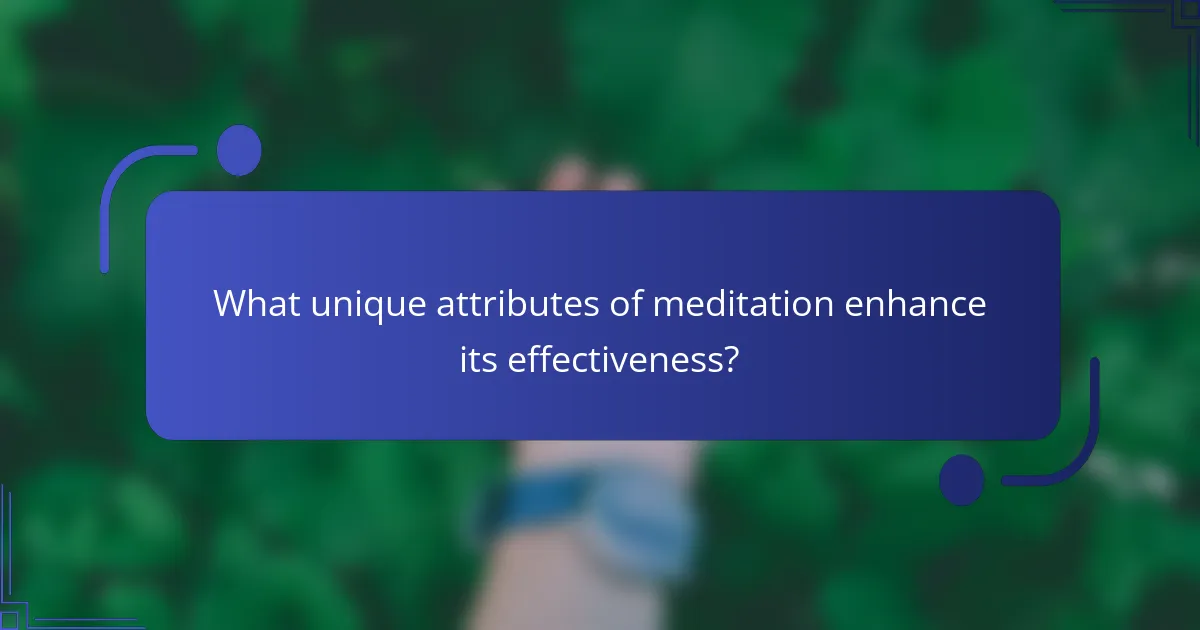
What unique attributes of meditation enhance its effectiveness?
Meditation enhances effectiveness through unique attributes like mindfulness, which increases present-moment awareness, and adaptability, allowing individuals to tailor practices to personal needs. These features foster deep relaxation and emotional regulation. Additionally, the ability to cultivate self-compassion during meditation promotes resilience against stress and enhances overall emotional balance.
How does the duration of meditation sessions affect outcomes?
Longer meditation sessions generally lead to greater benefits in stress reduction, focus, and emotional balance. Research indicates that durations of 20 minutes or more significantly enhance these outcomes. For example, a study found that participants who meditated for 30 minutes daily reported lower stress levels and improved attention spans compared to those who practiced for shorter periods. Additionally, consistency in session length contributes to cumulative benefits, reinforcing emotional resilience over time. Overall, the duration of meditation plays a crucial role in maximizing its positive effects.
Which environments or settings optimize meditation practice?
Meditation practice thrives in environments that are quiet, comfortable, and free from distractions. Ideal settings include nature, dedicated meditation spaces, and tranquil rooms at home. These environments enhance focus, reduce stress, and promote emotional balance. Natural light and calming colors further optimize the experience.
What personalized approaches can enhance meditation’s benefits?
Personalized approaches can significantly enhance meditation’s benefits by tailoring practices to individual needs. Techniques like guided imagery, specific breathing exercises, and mindfulness apps can improve stress reduction and emotional balance.
For example, using a meditation app can provide personalized sessions based on stress levels and focus goals, making meditation more effective. Additionally, incorporating elements such as nature sounds or aromatherapy can create a unique sensory experience that deepens relaxation and concentration.
Regularly assessing and adjusting meditation techniques based on personal progress can lead to greater emotional stability and improved focus over time. Individualized approaches ensure that meditation remains relevant and beneficial to each person’s journey.

Which rare attributes of meditation are noteworthy?
Noteworthy rare attributes of meditation include enhanced creativity, increased pain tolerance, and profound self-awareness. These unique traits differentiate meditation from other stress reduction techniques. For instance, studies show that meditation can boost creativity by fostering divergent thinking. Additionally, practitioners often report a heightened ability to manage pain, demonstrating a rare mental resilience. Lastly, deep self-awareness cultivated through meditation can lead to transformative personal insights, contributing to emotional balance.
How can specific cultural practices influence meditation outcomes?
Cultural practices significantly shape meditation outcomes by influencing techniques, beliefs, and community support. For instance, mindfulness practices in Western cultures often emphasize individual experience, while Eastern traditions may focus on communal aspects.
Cultural context can enhance emotional balance through shared rituals, fostering a sense of belonging. Additionally, specific practices like chanting or visualization can vary widely, impacting focus and stress reduction.
Research indicates that cultural alignment with meditation practices leads to improved effectiveness. Individuals who engage in culturally resonant techniques report greater satisfaction and lower stress levels, highlighting the importance of cultural integration in meditation.
What are the less common forms of meditation that offer unique benefits?
Less common forms of meditation include techniques like sound meditation, eco-meditation, and movement meditation, each offering unique benefits. Sound meditation enhances focus through auditory stimuli, while eco-meditation connects practitioners with nature, promoting emotional balance. Movement meditation, such as Tai Chi, combines physical activity with mindfulness, reducing stress effectively. These methods provide diverse approaches to achieving mental clarity and emotional stability.
How does meditation intersect with other wellness practices?
Meditation enhances other wellness practices by promoting stress reduction, improving focus, and fostering emotional balance. It complements practices like yoga and mindfulness, creating a holistic approach to well-being. For example, meditation can deepen the effects of yoga by enhancing concentration and relaxation. Studies show that individuals who meditate regularly experience lower cortisol levels, leading to reduced stress. As a result, integrating meditation with physical activities can amplify overall wellness benefits.
What are the best practices for integrating meditation into daily life?
To integrate meditation into daily life, establish a consistent routine, create a dedicated space, and start with short sessions. Gradually increase duration and explore different techniques.
1. Set a specific time daily.
2. Choose a quiet, comfortable location.
3. Begin with just five minutes.
4. Experiment with guided meditations.
5. Use reminders to stay consistent.
6. Reflect on your progress regularly.
These practices enhance the benefits of meditation, including stress reduction, improved focus, and emotional balance.


